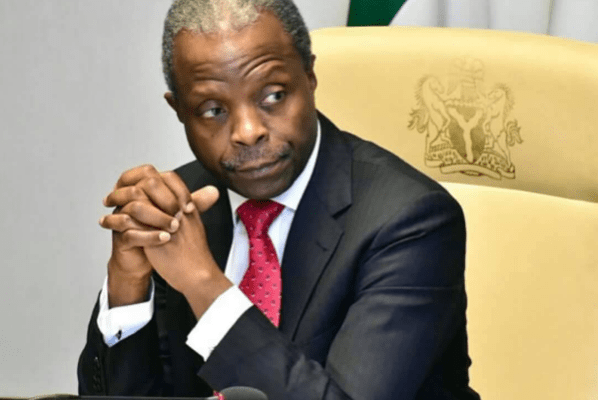Former President Goodluck Jonathan and the Peoples Democratic Party on Tuesday criticised Vice-President Yemi Osinbajo over his claim that the former President left Nigeria with debt and ruined the economy due to alleged corruption under his watch.
The Vice-President had during a lecture entitled, “Restructuring and the Nigerian federation,” delivered as part of activities marking the 40th anniversary of the Association of Friends in Lagos on Monday, accused the Jonathan administration of throwing Nigeria into untold hardship, recession and debt.
In a statement by one of his aides, Reno Omokri, the former President wondered why Osinbajo, who he claimed was recently indicted by the House of Representatives for an alleged corruption, should point fingers of suspicion at him.
The statement read, “How can Vice-President Osinbajo, a man who had just been indicted by the House of Representatives in one of the biggest corruption scams ever in Nigeria’s history, have the gall to point fingers of suspicion at Dr. Jonathan, a man that is celebrated internationally for his efforts at achieving Nigeria’s best rating in Transparency International’s annual Corruption Perceptions Index when Nigeria improved eight paces from 144 to 136 in 2014?
“Having read through the sordid details of Prof. Osinbajo’s corruption as revealed in the indictment by Nigeria’s House of Representatives, it is easy to understand why Nigeria made her worst ever retrogression in Transparency International’s annual Corruption Perceptions under him this year, moving 11 paces backwards from 136 to 148.
“On the issue of debt, the fact remains that in the entire 16 years that the Peoples Democratic Party governed Nigeria, the total amount of money borrowed was N8.06trn. These are facts sourced directly from the Budget Office controlled by the Buhari administration.
“However, in only three years, the All Progressives Congress-led administration of President Muhammadu Buhari has borrowed a total of N10trn. With this fact in hand, where does Vice-President Osinbajo have the moral authority to point leprous fingers at former President Jonathan?
“The claim by Vice-President Osinbajo that former President Jonathan left $63bn in debt is also a false claim. The Jonathan administration inherited $42.23bn in debt in 2011 which were debts borrowed by the states and the Federal Government.
He claimed that the nation’s debt he increased under the present administration because the Federal Government lacked the discipline that Jonathan had.
He added, “On Tuesday, November 13, 2018, the Debt Management Office revealed that in just 2017 alone, the Buhari administration borrowed N2.4trn to fund their budget deficit. This is besides other loans that they took in 2017 alone. That money is more than the funds borrowed by the Jonathan administration in five years!
“To show to Nigerians the profligacy and ineptitude of the current administration, I draw their attention to the fact that between July and August 2018, the Buhari administration claimed it had shared $322m Abacha funds recovered by the Jonathan administration to the poor. Then a week after it made that announcement, the Buhari government borrowed $328m from China.
“The question is this, why would you share out $322m one week only to borrow the same amount the next week? Why not use the Abacha funds to fund government activities instead of adding to the already strained debt burden?
“These are questions that Vice-President Osinbajo should answer rather than making false allegations against former President Jonathan.”
Also in a statement by its National Publicity Secretary, Kola Ologbondiyan, the PDP urged Osinbajo to stop ridiculing his office by always “bandying figures, peddling rumours and trending on false claims” in the attempt to cover the rot and failures of the present administration.
Ologbondiyan told Osinbajo that instead of juggling figures and making false claims about the nation’s debt profile, the Vice-President should present to Nigerians the scorecard of the present administration.
He said, “It is already a settled fact that the nation’s debt profile escalated under the profligate, uncreative and incompetent Buhari administration, which crippled our once robust economy, pushed it into recession, turned our nation from a growing economy to a debtor country and world’s poverty capital.
“Despite being busted, Vice-President Osinbajo is labouring to deceive Nigerians by converting domestic borrowings in naira, under the APC, to US dollars, so that the very high exchange rate will make it look smaller in dollars.
“This is despite verified figures even from agencies of government showing an accumulation of 29.6 per cent debt under Buhari as against the 20.14 per cent under the Yar’Adua and Jonathan administration and the 0.44 per cent under the Obasanjo administration.
The Punch

 News6 years ago
News6 years ago
 Featured6 years ago
Featured6 years ago
 Boss Picks6 years ago
Boss Picks6 years ago
 Headline6 years ago
Headline6 years ago
 Headline5 years ago
Headline5 years ago
 Headline6 years ago
Headline6 years ago
 Headline6 years ago
Headline6 years ago
 Headline6 years ago
Headline6 years ago













